Egypt is the largest producer in Africa and worldwide of long (LS) and extra long staple (ELS) cotton, accounting for around 50 percent of world production, it has built a brand reputation for its quality of cotton. Furthermore, Egypt has a vertically integrated textile and apparel industry, 90% of spinning and weaving companies are publicly owned.
Over the last ten years, there were a growing number of efficient private companies. However, the private sector dominates downstream industry with over 70 percent of garment production. The Egyptian government is targeting the encouragement of private investments in the up-stream industry, as well as, the down-stream industries.
Egypt and world’s largest spinning and weaving factory
Egypt is preparing to announce the establishment of the largest spinning and weaving factory in the world in Mahalla al-Kubra.
It is scheduled to be completed by the end of this year, after construction work was delayed as a result of the coronavirus pandemic.
According to the Holding Company for Cotton, Spinning, Weaving, and Clothes, this factory will be the largest in the world and will contribute to a major shift for this industry in Egypt. The factory marks the first step forward towards the development and modernization of the textile industry, through the government’s plan to develop it at a cost of more than LE21 billion over two years.
The plan includes great focus on increasing exports and improving the quality of production by importing the latest machinery from Italy and Switzerland.
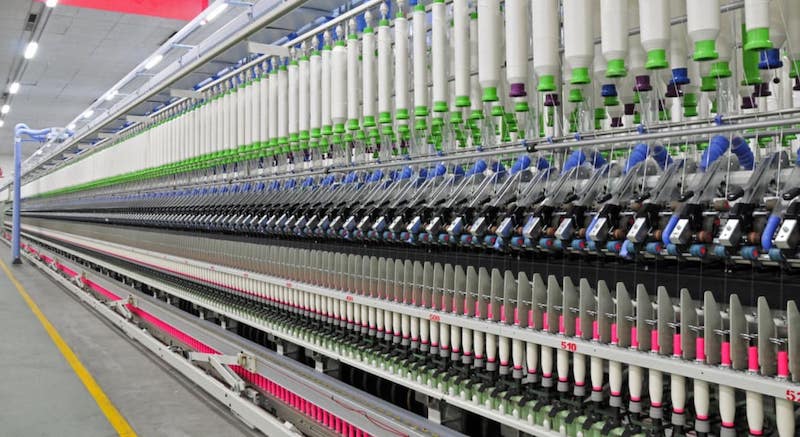
A comprehensive modernization strategy has been executed by the Egyptian Government to develop the textile industry for both, public and private sectors. Based on the strategy, the public sector plans to modernize the state-owned textile segment with an allocated investment of around 24 billion Egyptian Pounds over the course of three years starting 2019.
This budget will be financed by selling unused assets. This will be carried out by merging 24 public factories to only ten state-of-the-art factories, while also merging the current 24 cotton ginning factories to only 14 up and running facilities.
As for the private sector, there are plans to establish a training centre for workers to enhance their skills and expand their exposure, open new markets and activate the export support fund.
Lastly, the strategy aims to achieve a significant leap in the production capacity with a target production of 188 thousand tons of yarn yearly compared to 37 thousand tons; 198 million meters of fabric instead of 50 million meters and finally, 50 million pieces of garments instead of 8 million pieces.
The factory, which would be inaugurated in March 2022, Planned on an area of about 62,500 square meters, the factory accommodates over 182,000 yarn materials with an average production capacity of 30 tons of yarn a day, meaning the consumption of about 300,000 quintals of long cotton annually.
According to sources in the public business sector, workers are being trained on the latest technologies that will be installed in the factory, as well as in factories that will be developed soon in Cairo, Kafr al-Dawar and the Delta region.

The project will provide around 17,000 direct jobs, in addition to indirect job opportunities, and target exports to overseas markets.
Egypt has always played a critical role in world trade owing to its geographic status, connecting 3 continents with close access to all. But since the 80’s absence of many raw materials and supply chain depending on imported goods, Egypt’s textile sector could not reach to the world level it deserves.
Here, project of ministry will play a very important role in bringing fully integrated facilities to life. It won’t only accelerate the textile trade figures both in local market and exports of Egypt but it will also energize the competition to bring the sector to world standards.
Egypt’s exports of spinning, textiles rise to $1.5B in 2021
Egypt’s Spinning, textiles and home furnishings during 2021 increased by about 25 percent to reach $1.567 billion, compared to $1.245 billion in 2020.
The Chairman of the Council, Said Ahmed, indicated in a statement, that the spinning and textiles sector rose in 2021 by about 20 percent, recording $916 million, compared to $763 million in 2020, and the “home furnishings” sector achieved an increase of 35 percent to $651 million, compared to $482 million in 2020.
Saeed added that textiles exports accounted for 42 percent of the sector’s total exports, indicating that they had increased by 25 percent, recording $387 million compared to 2020, followed by yarn exports, which accounted for 31 percent of the total exports, registering $284 million compared to 2020, followed by technical textiles exports, which accounted for 14 percent of the total exports, and fiber exports by 12 percent of the total textile exports in 2021.
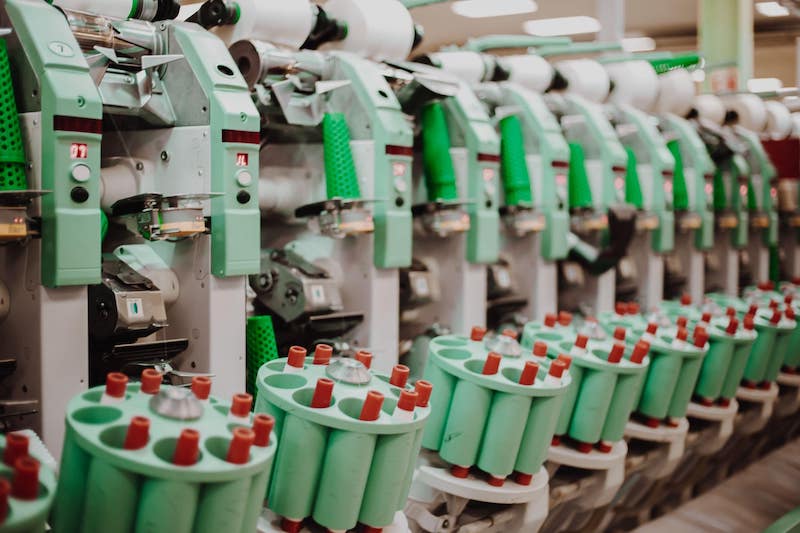
Saeed noted that at the level of the largest export markets for spinning and textiles in 2021, the volume of exports rose to Italy by 22 percent, and exports to Algeria increased by 18 percent, and rose to Saudi Arabia by 42 percent and then Germany by 2 percent.
He added that Egypt’s exports of spinning and textiles to Tunisia increased by 27 percent, to Nigeria’s market by 27 percent, and also to Jordan, with a growth rate of 24 percent.
The global demand for the textile products especially Cotton yarns and also the domestic sales have come down to a grinding halt due to the panic situation created by the outbreak of COVID-19. The spread of the virus in China and which later got spread to EU and USA has majorly impacted us as they are huge markets for Egyptian textile products.
– Egypt’s exports of yarn and textiles to European countries recorded the highest value compared to other international groups, reaching 97 million dollars in the first half of 2020, a decrease of about 32% compared to 116 million dollars in 2019.
– Followed by the Arab countries, where exports of yarn and textiles recorded 88 million dollars in the first half of 2020, a decrease of 24%, compared to 115 million dollars in 2019.
– As for both Africa and the United States of America, they witnessed an increase in the value of yarn and textile exports for this period, and Africa’s exports reached 19 million dollars compared to 17 million dollars in 2019, while the United States of America lost, It reached $ 7 million against $ 1 million in 2019.
– As for the rest of the world, exports of yarn and textiles recorded 154 million dollars in the first half of 2020, a decrease of 15% compared to 181 million dollars in 2019.

Egypt textile industries council to develop spinning, weaving sector
The establishment of this council came with the aim of developing textile industries at the level of the republic and coordinating efforts to strengthen all the textile industry’s circles and working to implement its strategic vision.
Minister of Trade and Industry Nevine Gamea has issued a decision to establish a textile industries council headed by the minister and includes a number of other state officials and experts in the field.
The establishment of this council came with the aim of developing textile industries at the level of the republic and coordinating efforts to strengthen all the textile industry’s circles and working to implement its strategic vision.
Egyptian government pays great attention to upgrading the spinning, weaving, and ready-made garments industry’s system in Egypt as per international standards that will meet the needs of the local market and enhance the quality of Egyptian products for export to global markets through expansion in all production phases.

Textile industries are among the most vital industries in which Egypt possesses great competitive advantages that qualify it to double its exports and access more foreign markets, she elaborated.
The decision specified competencies that the council is undertaking in coordination with the concerned authorities in textile industries, including listing the problems and obstacles facing this industry, setting an action plan to implement the state’s strategy and objectives for promoting and developing the spinning and weaving industry and an executive programme to implement the strategy.
It also includes studying the cost of local production and proposing the necessary measures to reduce these costs in a way that contributes to enhancing the competitiveness of local products compared to imported ones; and developing a map for textile industries that determines their gathering places, growth potential, and efficiency; increase their added value; and strengthen value chains.
The council’s tasks also include setting mechanisms to link feeding industries and major companies in the spinning and weaving industry and finding a modern mechanism to communicate with all world markets with the aim of presenting Egyptian products as a strong and competitive alternative to products from other countries.
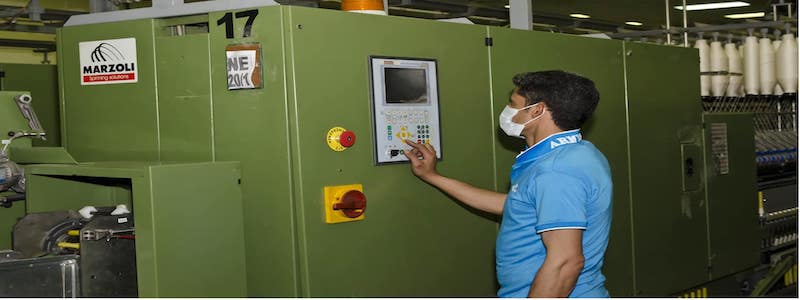
It also prepare a study to design Egyptian brands for the local market and export with the assistance of concerned authorities locally and internationally in this regard, as well as set up vocational training programmes to qualify the required employment for this industry and ways to implement it.
The decision stipulated that the council would have a technical secretariat to implement its recommendations and decisions with the concerned authorities, and to provide technical assistance in the council’s work.
9 Egyptian certified facilities for spinning

1- Egyptianspinning
www.egyptianspinning.com
Egyptian Spinning & Weaving Company, ESW, was established in 2005, with a land extension of 280,000m2. ESW is a private company belonging to one of the leading group in the textile sector in Egypt.
The Egyptian extra long staple cotton, it is well-known for its unique characteristic of a fine touch and silky look, most suitable to produce cotton Fine and Superfine counts as well as modal and micro modal. Such Superfine counts are used to produce high-end apparels with sheer comfort and excellence.
ESW has made its foray into spinning based on the strength of Egyptian cotton to do Fine and Superfine counts for quality conscious buyers. Our quest for excellence in quality is evident by the fact that our buyers have proved to be loyal to our product in time. We always stand behind our product and assure the finest service to our clients.
We are producers and exporters of Fine and Superfine yarns, compact yarns, gassed yarn, TFO yarns, with a count range from 20’s to 160’s in single, double and plied yarns etc.
At ESW we currently have a production capacity of 11 tons per day. Presently our mill has 64,000 spindles out of this 16,080 spindles are compact Rieter K44.
2- csatextile egypt
www.csatextileegypt.com
CSA Textile Egypt was established by Abalıoğlu Tekstil Sanayi A.Ş. who is the member of Abalioglu Holding Group. The investment started in 2006 and production was started in 2008 with 25,000 ring spindles. In the plant it is producing yarns with cellulosic fibers & cotton and their blending in the range of Ne 12/1 to Ne 50/1. It is using cellulosic fibers from Lenzing – Austria, like fiber types Modal, MicroModal, Tencel STD, Tencel LF, Viscose and Bamboo fiber from China.
All types of yarns in production shall produce in knitting and weaving torsions at “Z” or “S” way twist, as single or twisted yarns. Also it is able to produce slub yarns between yarn counts Ne 10 to Ne 30 with Amsler system.
CSA Egypt Follows all the innovations in the textile sector globall.
Our Aim is being a leader in our industry with our detail-oriented quality forms, out ambition in right and fast service and our enthusiasm in sharing our experience with our customers.

3- Alkan
www.almatex.com
In 1988 the Open-End factory in Amria free zone Alexandria, was launched over an area of 10,500m2, then in 1999 the company started the cotton ringspun factory in Sadat city – Second Industrial Zone- over an area of 81,000m2. The company started as an Egyptian joint-stock company in 2002 then company’s legal structure was changed to a private free zone. The company has a total work force is 1200 employees
For the ringspun capacity- which is the core of our business- started 10,800 spindles producing 720 tons per annum of fine counts. Currently, our capacity is 4,800 tons throughout adding new spinning spindle (conventional and compact).
The principal shareholder of Alkan Textile Company S.A.E. (Almatex) is Alkan Investment Company which is one of Egypt’s leading private business groups.
The spinning mill is located in Sadat City, an industrial area about 90 km from Cairo on the Alexandria desert road.
The existing mill produces 100% pure combed cotton yarns in the English count 16 NE to 120 NE, single and twisted (TFO).
The location at SADAT city is unique, being in the industrial zone gives us the flexibility we need to export to other countries through the good transportation means and other facilities available for the industrial zones.
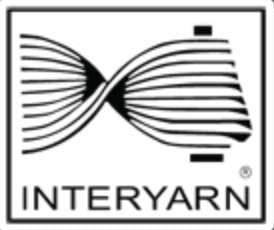
4- INTERYARN
www.interyarncotton.com
INTERYARN is a private share holding company located in New Borg El-Arab Industrial City – Alexandria – Egypt, the company was established in 2003 with its worsted Acrylic spinning plant for the production of Wool / Acrylic high bulk yarns.
At the beginning of 2010, INTERYARN started the construction of its new project with 40 000 Rieter K46 spindles in two phases to produce 100 % cotton compact yarns in fine and superfine counts relying on the unique and historical Egyptian Giza cotton.
The first phase of the 20 000 spindles has already been in production since March 2014, exporting all production to the world’s top weavers and knitters in Italy, Germany, France, Portugal, Turkey, India and Pakistan while preparation is now underway for implementing the second phase.
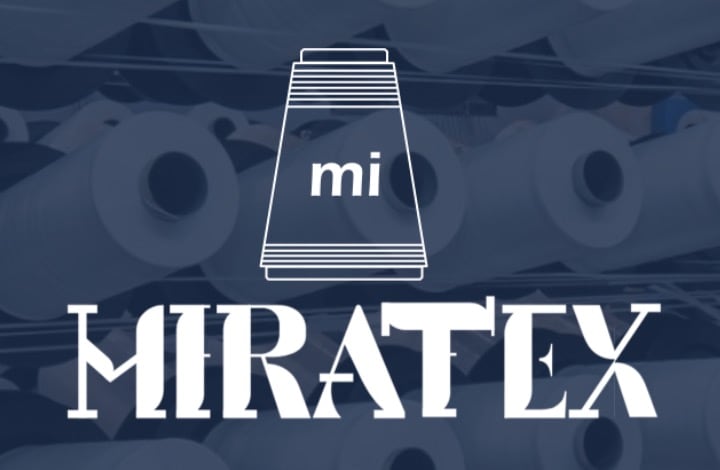
5- Miratex
https://miratexeg.com/
MIRATEX TEXTILE CO. was established by the Economic Cooperation Agreement concluded on 25/5/1974 between the governments of EGYPT and IRAN to secure the necessary investments for the Egyptian economy in the field of industrializing and exporting Egyptian cotton crop .
According to that agreement, both governments undertake to treat joint venture projects the same as their national projects .This project was established in accordance to the Minister of Economy and Economic Cooperation Decree no 206 / 1975 and is considered one of the big projects established within the Egypt’s open door policy .
The town of SUEZ was selected for this project to secure the goals of Egypt for developing the Canal area both socially and economically. The Company conducts its activities through the following factories:
Suez Factory, Ataqa Mountain, Governorate of Suez.
Minia El Kamh Factory, Governorate of Sharkia.
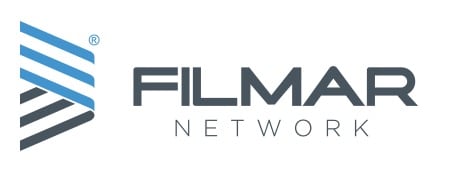
6- FILMAR NILE TEXTILE S.A.E.
www.filmarnile.com
Filmar produce and sell cotton yarns made of superior quality with a uniquely Italian feel. Since 1958 Filmar have been passionately seeking out the best ways to finish this ancient material, selected in its most valuable variety: 100% Egyptian cotton. Since it first started manufacturing, the company has chosen the philosophy of pursuing excellence in every aspect of work, from raw materials to end-user service. The quality of the 100% Egyptian cotton is pursued right from its origins, in the farms and cotton cultivation acquired by the company directly in Egypt.
Continuous and substantial investments have led to the creation of new production areas in Italy and Egypt – with a total of 46,000 square meters. Cutting edge machinery ensures a annual production of 7 million kilos of dyed yarn.
With the experience gained in over 50 years, Filmar is now an established market leader both in and outside Italy, and is continually penetrating further into global markets.
With the launch of the new Filmar Nile Textile plant in Bourg el Arab, near Alexandria, Filmar inaugurated the 100% Nile brand. 100% Nile is 100% Egyptian cotton cultivated in the Nile Delta. The best quality cotton in fact originates from here, where the silt and water of the “great river” make this land extremely fertile. Cotton plants prosper thanks to the combination of the river water, the hot Egyptian sun and the dry climate of the nearby desert areas. It is the same water of the Nile, along with the salt of the nearby Medi¬terranean, which is used by Filmar for finishing the raw material.
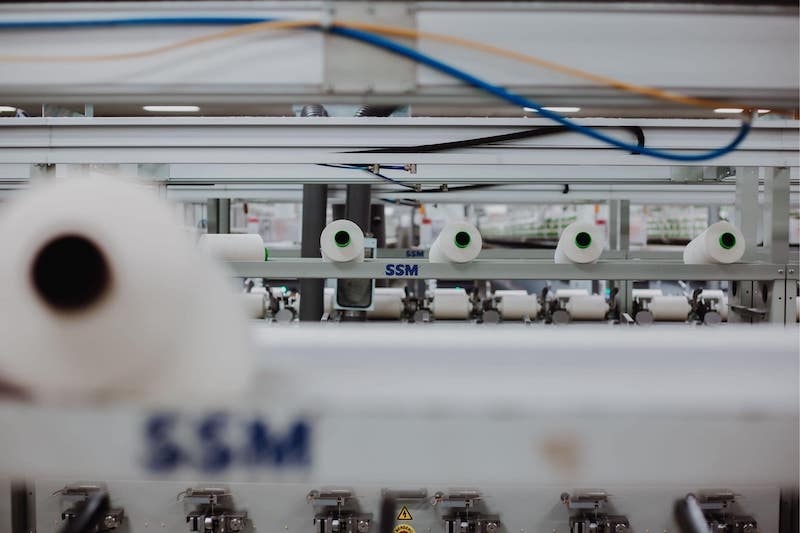
7- Giza spinning and Weaving S.A.E Sadat Branch
www.nilespin.com
Giza spinning & Weaving CO. S.A.E Sadat Branch . was established in 2008. Since this date, the company does its best to be the best company in the field of manufacturing fine spinning and ready made Garments. To achieve such goal, the company set fixed steps. company knowing that the product quality is not implemented by commitment only. but with results and evidence.
For this aim, the company seeks to follow the principle of continual improvement in the common relationships with customers and suppliers as well as compliance with world standards in product quality to satisfy our customers. and depending largely on feedback from the own part of our customers to develop the performance of the company.
1- The capacity of spinning factory is 100000 spindles. While spinning production capacity is n 13 tons per day from the combed yarn for ranging from 30 : 150 NE and from carded yarn for ranging from 12 : 50/2 NE .In order to produce such products, the company uses a variety of raw materials such as High-Quality Egyptian cotton, American Cotton, and Greek cotton to satisfy all its customers.
2- The production capacity for ready-made garments is nearly 2 million pieces of ready-made garments per annual.
 8- Eshratex
8- Eshratex
www.eshratex.com
EshraTex was established in Alexandria, Egypt in 1970 as a textile yarn trading company importing and outsourcing various manufactured yarns (acrylic, polyester and cotton). EshraTex became the local market leader with 60% market share within five years.
EshraTex built its polyester manufacturing facility (ISO 14001:2015, ISO 9001:2015) in 1990 in the Borg El Arab Industrial Zone with an initial capacity of 15 tons per day which was doubled three years later.
EshraTex expanded its production with a brand new cotton spinning mill (ISO 14001:2015, ISO 9001:2015, Oeko-Tex Standard 100) in 2007 that specializes in high-quality fine yarn with a daily production of 8 tons per day.
EshraTex Group produces annual sales of 30 million dollars and reached a total investment of 53 million dollars.

9- Mediterranean textile company
Mediterranean Textile Company in Egypt belongs to the reputable Saif Group conglomerate company. Proudly, we spin and export 100% Egyptian cotton yarns i.e. Giza cotton (with multiple counts). MTC offers complete traceability with a DNA test guarantee. Currently, we are accredited members of the Cotton Egypt Association with Gold Seal and Supima Council.
Our history goes back to 2006 when we established our factory in Borg Al Arab industrial area, Alexandria. It covers a massive factory of 30,000 sq. meters on an 88,000 sq. meter land area.
Proceeding forward, we produced and exported high-quality yarns. We rely heavily on Egyptian cotton (Giza cotton) as it is reputably amongst the best cotton in the market. Moreover, we also use different types of high-quality cotton e.g. Supima cotton and organic cotton, to produce high-grade yarns.
Subsequently, Mediterranean Textile Company became the largest producer of compact cotton yarns and the largest exporter of yarns in Egypt.
Proudly, Mediterranean Textile is Egypt’s largest producer of all types of yarns. Our Products include but are not limited to weaving yarns, knitting yarns, and cotton sewing threads, raw white yarns, dyed yarns, and mercerized yarns.




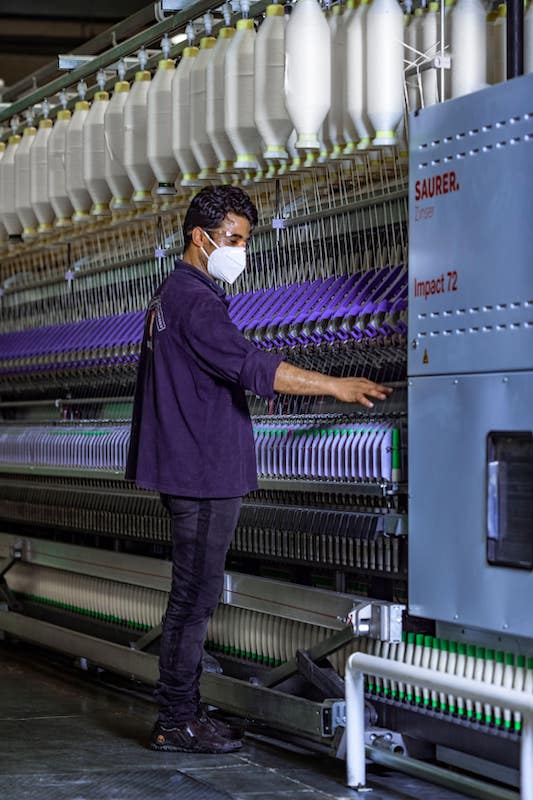

















We are interested to buy stocks of knitted Hosiery fabric dyed ore undied any quantity kindly send details and can quote prices.thks
We are interested to buy stocks of knitted Hosiery fabric dyed ore undied any quantity kindly send details and can quote prices.thks
I am saleem Muhammad Pakistani citizen I have 25 years experience in textile open end spinning mills as general manager work in quality production technical side can apply in Egypt for job